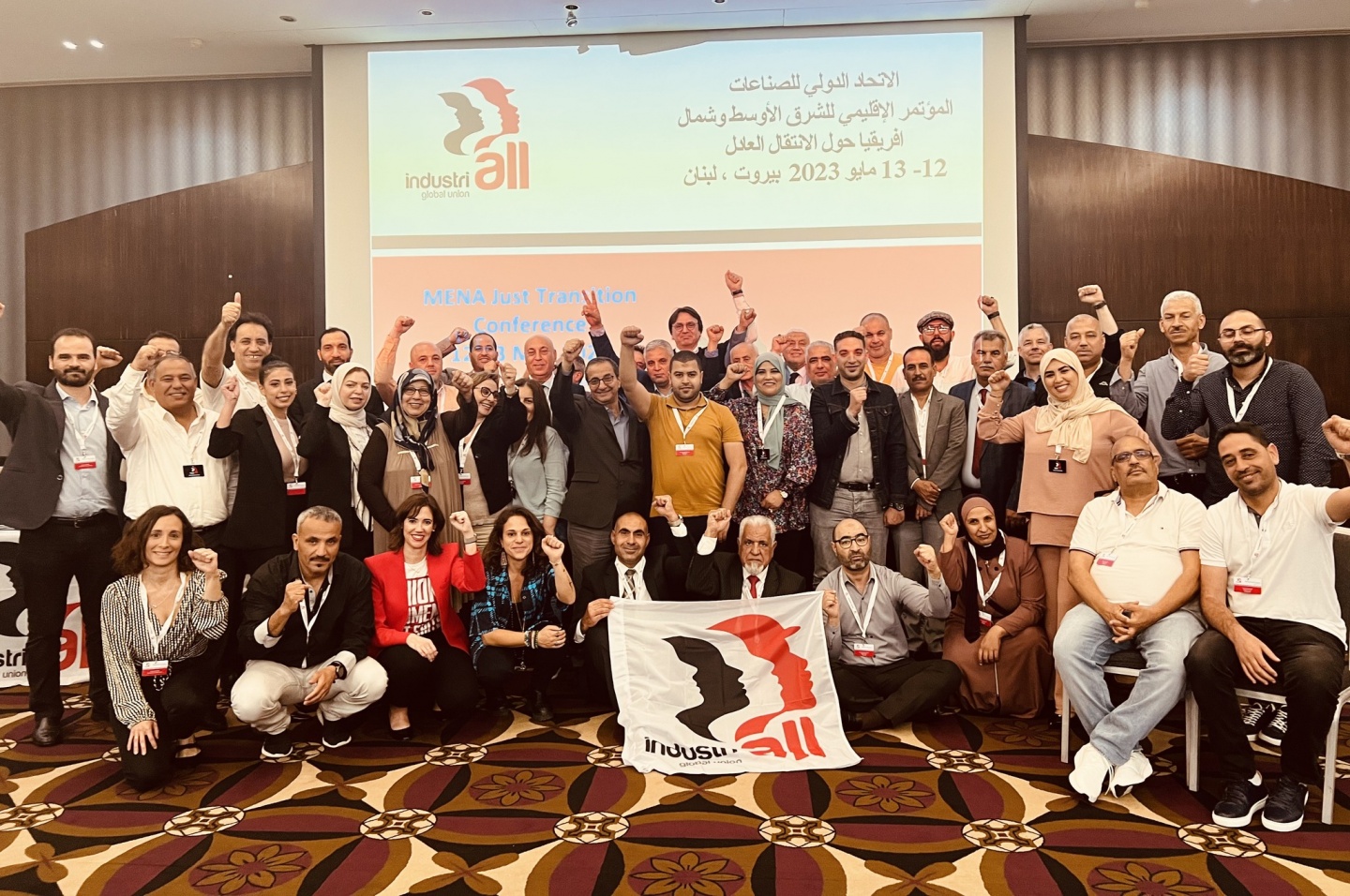Read this article in:
English
25 May, 2023Trade unions in the MENA region are fighting for a Just Transition based on fundamental human rights. IndustriALL MENA Just Transition conference in Beirut on 11-13 May brought together unions from Lebanon, Iraq, Egypt, Morocco, Tunisia, Algeria, Jordan, Palestine, and Bahrain to discuss the situation in the different countries and action plans for a transition that is just and fair for workers.
The situation varies across the regions, but everyone needs to be prepared for the changing trends and what they will mean for workers. What will happen to the oil and gas industry in Iraq when there is less demand for fossil fuels? How will new production schemes with increased use of robots in auto factories affect workers?
Presenting on a just transition for Morocco, energy governance specialist Diana Kassy, told participants that the country has pledged to upgrade its efficient energy system by channelling 52 per cent of its energy consumption from renewable sources (20 per cent using solar energy, 20 per cent wind and 12 per cent hydro).
"Iraq still relies on fossil fuels and has no plans to move to renewable energy. The priorities are job creation, improving jobs, stopping child labour, ensuring transition, improving the private sector,"
said Maha Katta, coordinator for the International Labour Organization in Iraq.
“A just transition in Iraq's energy sector is a tripartite problem. Unions must take large part of the work as it affects our members. We need an action plan and we need toot increase awareness,"
said Hashmeya Alsaadawi, vice president of General Trade Union of Electricity Sector Employees of Iraq - GTUESE and IndustriALL vice president.
Unions in Algeria's energy industry are shut out from the work to implement an effective energy transition in the country.
The situation for unions in Lebanon differs from other countries due to the pressing economic and political situation.
"More people are using solar panels as the energy supply is not sufficient, but the government doesn't have an energy strategy,"
said Waleed Oliek, president of Federation of Petroleum trade unions in Lebanon.
"We need economic and union reforms to meet the transition."
Although conditions differ in the countries in the region, a common denominator is a lack of respect for workers’ rights and a tendency to not engage in social dialogue and invite unions to the table. And yet workers are at the centre as they create the value and suffer the impact of the crises; workers are the means and the end to a just transition.
“We are at the center of the changes in the various sectors - no choice for us but to take our responsibility of ensuring that our voice is heard and interests are considered,”
said Habib Hazami, general secretary of Tunisia Fédération Générale du Textile, de l'Habillement, Chaussure et Cuir - FGTHCC-UGTT and IndustriALL Global co-chair of the textile and garment sector.
As national action plans for a just transition were discussed, participants agreed that despite the challenges ahead, it should never be a choice between the environment and employment. We can do both - we can protect the environment and we can protect our jobs. Participants stressed that unions cannot do this on their own - governments and multinational companies have to be involved.
Mark Hagen from the ITUC Just Transition Center described the climate impact in the region on the workers and the five pillars of a just transition; skills/reskilling; workers; strategic planning investment; social security systems; human and workers’ rights.
“Only a planned transition is a just transition. With plans – company, industry and regional – on what steps to take, we can create the future we want,”
said Mark Hagen.
Last year, IndustriALL published a trade union guide of practice for a just transition. Diana Junquera-Curiel, IndustriALL director of energy industry and just transition, invited participants to create roadmaps for the future:
"The transition is happening, and you need to be prepared. The work ahead is difficult, but as our discussions here show, we need to take the necessary steps to plan for our future. For our future jobs and livelihoods.”
“A transition changing the world of work is underway and it is important that we, the unions, engage in order to create the responses we need. IndustriALL is proud of commitment shown in learning and strategizing on the Just Transition process,”
said IndustriALL assistant general secretry Kemal Özkan.
The conference issued a statement calling for a Just Transition, decided to establish a regional union Just Transition committee, an online forum on Just Transition, and adopted an action plan. The action plan focuses on training and awareness raising, engaging with government and business, organizing in renewable energies, coordinate with civil society on transition issues, and addressing the transition consequences on gender and youth.
Ahmed Kamel, IndustriALL MENA regional secretary said:
“The affiliates presented examples of their engagement and negotiation on transition at different levels in the region. This is an inspiring debate that shows both the knowledge and commitment of our affiliates on the various aspects of Just Transition.”










